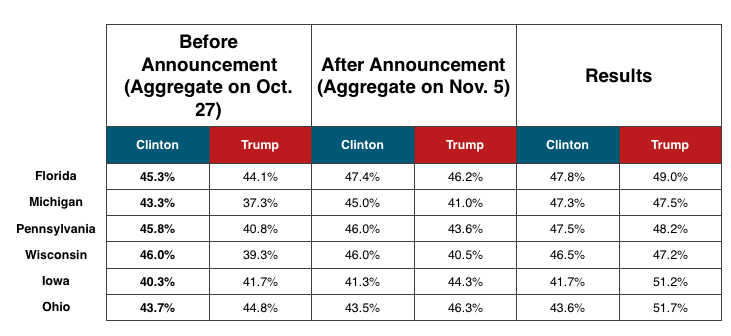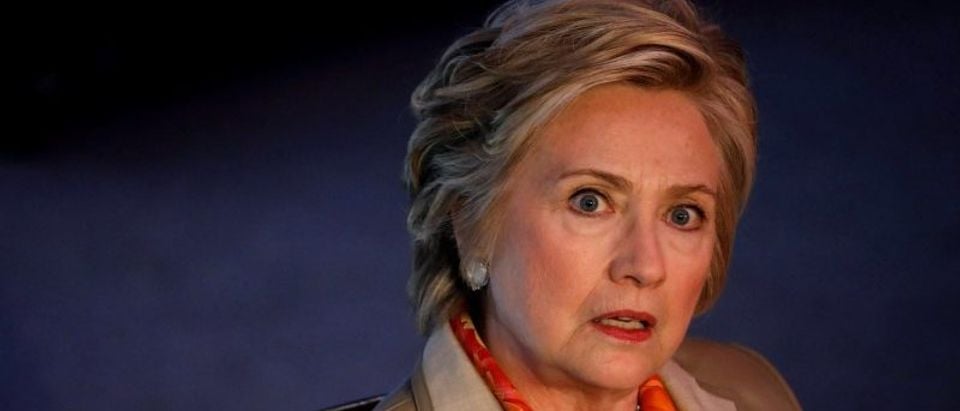Spring is here. Trees bud, flowers bloom and Hillary Clinton has emerged from her long winter of discontent. She came back to try to convince us that if not for FBI Director James Comey, she’d be president today.
Like Ronald Reagan famously said, “Facts are stubborn things.” According to Hillary, if the election had been held on October 27, AND if Wikileaks hadn’t released the emails of John Podesta and other Democratic officials, AND Russian President Vladimir Putin hadn’t interfered, AND Americans weren’t such misogynists, she and Bill would be back living on Pennsylvania Avenue. Other than that, Clinton told CNN, ”I take absolute personal responsibility.”

Welcome back to reality, Mrs. Clinton. Here are a few facts you might have forgotten.
A quick review of public polling numbers from Real Clear polling aggregates in the six states that Obama won, but Clinton lost, show that Clinton’s numbers actually grew for the most part after Comey’s announcement.
In fact, according to a much-anticipated new report from the American Association for Public Opinion Research, the Comey letter was not a factor. The report shows Clinton’s support beginning to drop in the days leading up to the letter. “October 28 falls at roughly the midpoint (not the start) of the slide in Clinton’s support.”
Several factors were far more damaging to Hillary Clinton’s campaign than the ones she peddled to CNN. It sounds cruel, but the American people just didn’t like or trust Hillary Clinton. In August, long before the October surprise, a Washington Post-ABC News poll showed Clinton with the lowest popularity numbers in her decades of political life. Fifty-six percent of Americans didn’t like Clinton. That’s why she could never crack the 50 percent popularity mark. Her numbers were also sagging in groups that had traditionally supported her – women, Hispanics and liberals. In focus group testing during the campaign, we heard from those same groups telling us that in good conscience, they simply could not vote for Clinton. Comey’s letter paled in comparison to the Benghazi deaths, the Clinton Foundation scandals in Haiti, the private e-mail server and insulting nearly half of the electorate with the “deplorable” quote.
In focus groups we also learned that voters wanted specifics and a plan to move America forward. Donald Trump delivered, Clinton did not. In jam-packed rallies across the country, Trump painted a picture of what America would look like if he was president. Voters knew what a Clinton presidency would look like—four more years of Obama-like policy failures coupled with a whole new round of Clinton scandals. That’s not what America wanted.
Perhaps it makes Hillary Clinton feel better to sit with her old friends at CNN and spin tales to the least trusted cable news network about how she could have been president, “If only…”
CNN and Hillary have a lot in common. Neither recognize how most Americans feel, and they both are still unable to accept that Donald Trump is the President of the United States.
Jay Connaughton served as a Media Advisor to President-Elect Donald J. Trump’s campaign. Connaughton is a leading national political ad strategist who has worked on many major campaigns over the last 20 years. His creative strategies have helped shape and win elections for Republican U.S. Senators, Congressmen and elected leaders at all levels of State Government. Connaughton is managing partner of People Who Think, an advertising agency with three core divisions: Innovative Advertising, Innovative Politics and Fridge. People Who Think is a highly awarded agency having received hundreds of Addy and Pollie awards.


